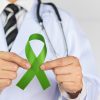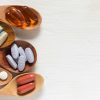Radiation therapy is applied in various ways for prostate cancer. It can serve as part of the initial treatment when the cancer is confined within the prostate, or be used to address cancer recurrence after surgery. Additionally, radiation therapy helps to prevent or alleviate symptoms in individuals with advanced cancer. The specific type of radiation therapy chosen is always tailored to the individual’s condition.
However, like many treatments, it can lead to side effects. These may include bowel problems such as diarrhea, flatulence, rectal pain, or a burning sensation, as well as urinary problems like urinary cystitis and urinary incontinence. Patients might also experience tiredness and weakness, lymphedema (swelling caused by lymph fluid buildup), and difficulties with erections.
While these side effects can occur, it’s important to note that many effective strategies, including dietary adjustments, can help manage or ease them. We’ll now delve into how specific dietary choices can support side effect management.
Diarrhea
Did you know that food contains two distinct types of dietary fiber: soluble and insoluble? Soluble fiber dissolves in water, forming a gel-like substance in the intestines, while insoluble fiber does not dissolve in water and adds bulk to the stool.
To help manage diarrhea as a side effect from treatment, it is recommended to increase your intake of soluble fibre, which helps to solidify stool. At the same time, consider limiting foods rich in insoluble fiber.
Let’s explore some common food sources where you can find each type of fibre.
Increase your soluble fibre intake with these food choices:
- Oats, bananas, white bread, rice, pasta
- Skinless fruits, plums, peaches, carrots, skinless potatoes
- Chickpeas, peas, beans
Limit your insoluble fiber intake by reducing the consumption of these foods:
- Wholegrain bread, wheat bran, brown rice
- Nuts, citrus fruits, berries, spinach, cabbage, potatoes (with skin)
Additional Tips for Managing Diarrhea:
- Reduce or avoid greasy, fried, and spicy foods
- Avoid alcohol consumption
- Ensure adequate fluid intake (at least 8 glasses of water a day) to prevent dehydration
Tiredness and weakness
It is very common to experience tiredness and weakness following radiation therapy. This reduced energy can lead to a poor appetite, which in turn might decrease your overall intake of nutrients, potentially exacerbating symptoms due to insufficient energy and nutrients. To support your recovery and rebuild stamina for daily activities, consuming adequate energy and nutrients is crucial. While all foods offer energy, those rich in protein are particularly important for bolstering your immune system and maintaining muscle mass.
Protein-rich food sources include:
- Animal protein: fish, meat, chicken, seafood, eggs
- Dairy products: low-fat milk, unsweetened yoghurt, low-fat cheese
- Plant-based protein: tofu, soy milk, tempeh, beans, dhal, nuts, seeds
Tips to maintain your energy levels during treatment:
- Aim to include protein in every meal and snack, and try consuming it first
- Eat small, frequent meals
- Even if you are not hungry, avoid skipping meals
- Stock up on convenience foods like canned beans, sardines, tuna, dairy products, soy milk, nuts, frozen fruits, and vegetables for quick, nutritious meals
- If eating enough becomes a significant challenge, consider discussing oral nutrition supplements (ONS) with a dietitian who can provide tailored recommendations
If you wish to understand your protein requirements in detail, consider scheduling a personalised dietary consultation with a dietitian for professional guidance.
Urinary problem
In addition to medical treatments, adopting certain lifestyle changes can significantly alleviate urinary symptoms such as bladder irritation, increased frequency, sudden urges to urinate (urinary urgency), and urine leakage.
Tips to manage urinary issues:
- Drink plenty of fluids (at least 8 glasses of water daily) to help prevent bladder irritation and infection
- Limit caffeine and fizzy drinks
- Avoid or reduce alcohol intake
- Perform regular pelvic floor muscle exercises
- Ensure adequate fibre and fluid intake, as constipation can exert pressure on pelvic floor muscles
- Maintaining a healthy body weight is beneficial, as excess weight can also contribute to pressure on these muscles
Looking for a recipe that can help boost your energy and protein intake? Check out our 365 recipes here!






